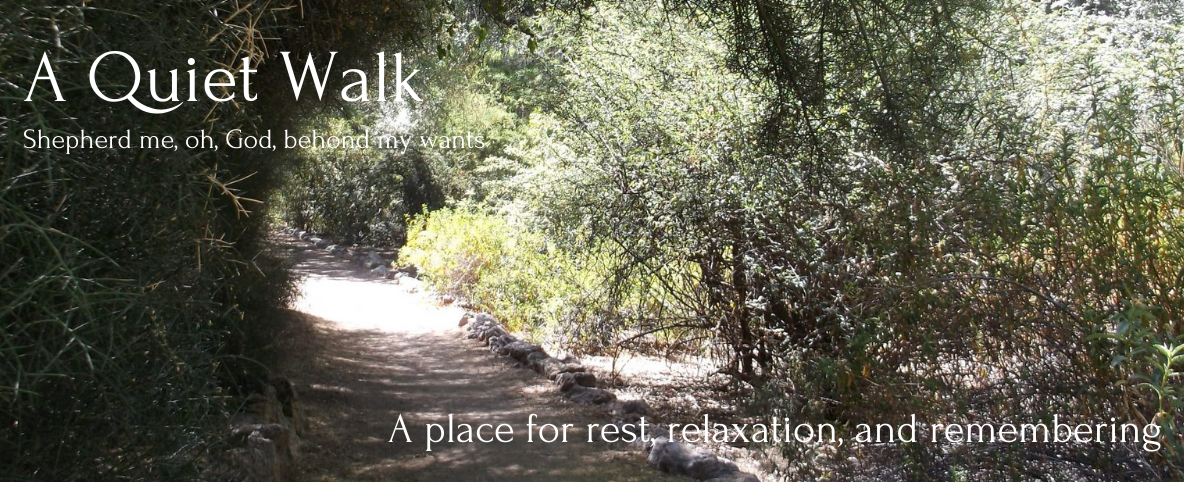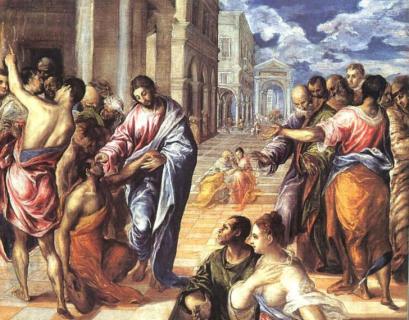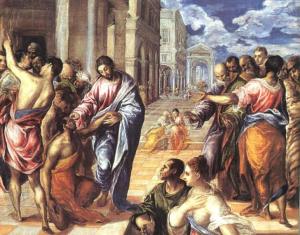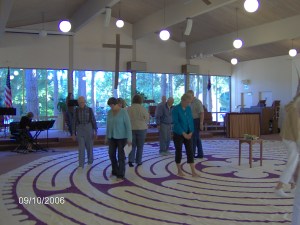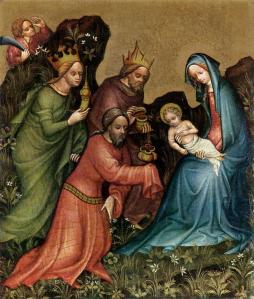Matthew 22:1-14 Once more Jesus spoke to them in parables, saying: 2“The kingdom of heaven may be compared to a king who gave a wedding banquet for his son. 3He sent his slaves to call those who had been invited to the wedding banquet, but they would not come. 4Again he sent other slaves, saying, ‘Tell those who have been invited: Look, I have prepared my dinner, my oxen and my fat calves have been slaughtered, and everything is ready; come to the wedding banquet.’ 5But they made light of it and went away, one to his farm, another to his business, 6while the rest seized his slaves, mistreated them, and killed them. 7The king was enraged. He sent his troops, destroyed those murderers, and burned their city. 8Then he said to his slaves, ‘The wedding is ready, but those invited were not worthy. 9Go therefore into the main streets, and invite everyone you find to the wedding banquet.’ 10Those slaves went out into the streets and gathered all whom they found, both good and bad; so the wedding hall was filled with guests. 11“But when the king came in to see the guests, he noticed a man there who was not wearing a wedding robe, 12and he said to him, ‘Friend, how did you get in here without a wedding robe?’ And he was speechless. 13Then the king said to the attendants, ‘Bind him hand and foot, and throw him into the outer darkness, where there will be weeping and gnashing of teeth.’ 14For many are called, but few are chosen.”
The above text is about how we are invited into God’s grace. However, what we do with that grace is entirely up to us. We can ignore it, accept it but only on our terms, or completely live into the gift of grace. What we do will be our choice and that choice will determine how we live our lives. The following is the text of the sermon I preached on August 23, 2015, at my home church, Queen Anne Christian Church, Seattle, WA.
On a warm June afternoon in 2000 I was sitting at the entrance to the primary hotel in Vallejo CA. I was waiting for a bus to come and deliver John to me who was taking the bus from the Oakland airport. I could hardly contain myself, you see in just a few short weeks I would be retiring from my consulting job and moving back to Edmonds. John was coming to help me pack-up the apartment and drive with me back to WA. We would be married in September. This was the beginning of 6 months of celebration that has extended into nearly 15 years. I had accepted an invitation, I said yes. I knew that in that acceptance I would now be living a new life and one that would require me to make the choice to change from a life of taking care of only me to taking care of someone else. Now that’s a huge change for someone who was 53 and never married. But it was a choice that I have been grateful for ever since. As a result I was blessed with a new life that has had its challenges and its joys. That’s what happens when you chose to transform your life. Life can be a bed of roses, but what you must remember is roses have thorns and you can be sure you will sometimes get stuck with one, or more, of those thorns.
The scripture from Matthew is not only about choosing between accepting and refusing an invitation to a wedding banquet given by a King, it is about choosing between accepting or refusing to live a transformed life of free grace in the way we were meant to live. And, to deciding to live a transformed life means accepting all of that life of grace. It means we are to commit to live that life no matter what gets thrown at us or how many thorns we run into. Living a transformed life of grace doesn’t mean there won’t be thorns, or potholes, or great sorrows on your path. It means we have the strength to walk through them.
Matthew’s version of this story, which is also found in the Gospel of Luke, is actually two parables about invitations. It’s a story about a king, who wants to invite people to celebrate the wedding of his son with a banquet. Matthew adds two additional details to the story; the first is when some of the king’s friends’ killed his slaves and he attacks and wipes out the kingdoms of those who committed those atrocities.[1] It is accepted by most interpreters that this part of the parable, Verses 6 and 7, are an interpretation of Matthew’s who is reading back into this parable the destruction of Jerusalem and the Temple. Matthew adds it because within his community he has people who are struggling with the loss of their ancestral home. It is not believed to be part of the original parable from the time of Jesus, the oldest version of which is found in the Sayings of Q. Actually these verses are much more characteristic of an interpretation of God from the Hebrew Text rather than the life and teachings of Jesus.[2],[3] Matthew’s second addition are the last 4 verses, verses 11-14, of the story where Jesus tells one more story of the banquet[4] and this addition is very important in the way Matthew wants us to understand and respond to the divine invitation to a new life. Together these two parables are stories about the life choices we make and what we do with those choices.
So here we have a story of a King, who traditionally is identified with God, and throws a wedding party for his son, Jesus. Those are the traditional interpretations of Matthew’s King and Son. But I want to you think about a what if. What if we look at this story from a different perspective? What if we turn it upside down? What if instead of the King being God the King is Jesus who’s throwing a wedding banquet for the Children of God who he invites to live a new life? How will that perspective change the way we hear and see these parables?
Now even though the Matthew’s setting of the parable is Jesus defending himself before the religious authorities Matthew wasn’t referring to “the Jewish authorities” as the ones who refused to attend, or that the ones who came were only “Gentiles.” Rather, most interpreters now believe Matthew was addressing his own conflicted community who he wanted to live a transformed life.[5] The Jewish Jesus followers of Matthew’s community were struggling with the loss of the temple and his Gentile Jesus followers were struggling with whether they should or should not become Jewish. All this would have made for many conflicts between the different factions and Matthew is trying to bridge the gap between them. I too am not suggesting that there are specific groups being discussed in these parables. So depending on which version you like the best, think of the players in the 1st century as Matthew’s neighbors or in our very own community as our neighbors right now in the 21st century.
So here is how the story might sound if we told it as if Jesus was throwing this shindig? The guests Jesus first invites to his amazing banquet are those he expects will accept the invitation because they already understand, or he thinks they do, what it means to live the transformed life He is offering them. Jesus wants them to come and celebrate with Him, to become part of the new life that only happens when we accept the Divine invitation. An invitation of free grace to live the life we are meant to live in the presence of God, Jesus and Holy Spirit. So he sends his disciples out to bring his guests to the party; the food is ready, wine is poured, the orchestra is tuning up for an all night event. But his disciples come back and tell him all have refused, all are too busy with the details of life, the minutia of daily living. So what does he do, after all he has a hall prepared, food on the table, wine chilling, and musicians waiting? Well, Jesus did just what he told his disciples to do when he sent them out to preach and the invitations they gave were refused. He “dusted the dirt from His sandals” and turns his back on those who refused him and sends his disciples out again into the streets and to the city gates to bring in whomever they find to the party, the good and the bad, the worthy and the unworthy. With the diligence of his disciples the hall is soon filled to overflowing.
Who were the people from the streets? Well if we think of who are the people of the streets in the 21st century you might first of all think of the homeless tent encampments, or the people living under a bridge, or the man or woman standing on the corner with a sign that says “Homeless vet, needs food and job.” And think of the shop keepers in the poorest parts of any town. It was people like these who were the ones who were welcomed into Jesus’ party. They were the nobodies of the town and here they were going to a big party given by the most important person in town. Can you imagine how they felt? Can’t you just hear them as they walk to the mansion, “Jesus invited me, me, to his party,” “You too, I can’t believe it,” “I was invited too, and get this, the man said come as I am, how cool is that.” Unlike Jesus’ first guests these guests weren’t concerned about who would be attending. It didn’t matter to them that the person next to them was a drug addict, a thief, a prostitute, a shop keeper, or a prosperous business person. They didn’t care if Jesus was failing or succeeding in life. They were excited about being invited. They understood the importance of being invited to this banquet, this table. They wanted to have new lives. Unlike those first invited they knew their old lives weren’t working for them and they were willing to change and live new lives, transformed lives of grace that had meaning.
As the guests enter the hall they see the banquet tables set up with every food imaginable, roast lamb, poached fish, pastries, bowls of fruit, cool drinks, and wine, good wine, not the cheap stuff. In the corner an orchestra was playing, with real instruments not a wash tub and jug band. Everyone was celebrating, drinking, eating, and dancing to the wonderful music. That is, everyone except this one guy who had piled his plate up with everything it would hold and was eating it in the corner telling anyone who would listen, “well it’s about time this Jesus dude recognized just who makes this town what it is.” “I deserved this invitation, but don’t expect me to go overboard for him; this is what we should have had all along. In fact I think I will just take everything I can. And I’m going to let this Jesus person know that I’m not going to do anything unless I really want to just because he invited me to this party.”
When Jesus comes in to join his guests he sees this guy in the corner and he says “Ah, excuse me, why aren’t you celebrating. This is a joyous occasion, you come expecting to be fed but you won’t celebrate your new life. You come in and can’t see the joy of living a life of peace, and justice. You blame me for your suffering but you did nothing to help those who suffered as well. I was there to help but you wouldn’t come out, is that my fault? You accepted my invitation to grace but only on your terms? It doesn’t sound to me like you understand what it means to come to one of my banquets; I don’t think you belong here, yet. Show this guy out until he understands what it means to come celebrate a transformed life.”
Jesus knew people had options in their lives. The trouble was those options weren’t working for the majority of the people. True the religious authorities and the Roman authorities were doing ok, but if you look at the number of people who were killed in order for someone else to advance socially or politically their options weren’t working for them either. So along comes Jesus with an alternative way of living a life that didn’t involve beating up, or tearing down someone else. But Jesus wasn’t offering a new idea. For centuries the Prophets of Israel were telling the people the same thing. Moses says in Deuteronomy (30:19b) “Choose life so that you and your descendants may live.” Every Prophet since Moses, including Jesus, has said the very same thing and the people listened and accepted life, for little while, then the ‘easier’ way of greed and self-centeredness takes precedence and the original message of grace goes by the way side.
But what does it mean to choose life? Well “When you say ‘Yes’ to life you say ‘Amen’ to all of life as a package deal. Thereafter the so-called problems you have with personal injustice do not arise. You renounce your concept of victimhood and the old impulse to complain about being unfairly treated.” A “commitment to life . . . refuses to make any distinction between your outer life and your inner life, or between secular and sacred spheres of life, or between loving God, loving all of life, or loving one’s neighbor. Nor does it distinguish between your current life concerns or your eternal concerns. On the contrary, it simply calls for an unhesitating and unreserved ethical response to the call of life, the call of Jesus, God, and Holy Spirit – right where you are at this moment in time, at this point in your life,” to live a life where you defend justice for all and refuse to accept injustice for anyone as an expedient to living.[6] That is what Jesus taught, that’s grace. It’s not new information, its old stuff we haven’t listened to, at least not for long time.
That is what happened to our disgruntled guest. He may have accepted the Divine invitation of free grace to attend the banquet, but his acceptance had no depth to it, it never went beyond saying I’m here, thanks for the food, see you later. He was glad to accept the invitation to grace but on his terms only. He never truly transformed his whole life. He never saw that living in the presence of Jesus meant he had to let the inner life make its way to the outer side of who he was. It meant he had to share the love, peace and abundance of grace with everyone he met, not hoard it. He came to the banquet not because he wanted to live a life transformed but because he wanted what he could get and then live as he always had. That’s not change, it is not celebration and it’s not joy, and it is not committing to living a transformed life. It’s keeping the old life and saying it was good enough in the past it will be good enough now.
No matter how you tell today’s story it’s about Divine invitations, the acceptance of grace, and how you live once you’ve accepted God’s grace. When John asked me to marry him, I had a number of options. Like the first invited guests I could have refused and that would have been that. I don’t know where I would have been 15 years later but I am quite certain it wouldn’t have been here. But I did say yes and again to that yes I had options as to how I was going to live within this new relationship. One, I could continue to behave as I have always behaved. Taking care of me, making sure I had what I wanted and what I needed. Yes John would be there but our relationship would not have been very deep because I wouldn’t have let him into the deeper part of me, the part of me that would have built the relationship where both of us would have benefited. These two options were not the ones I chose. Instead I let John into my heart and said we are partners and what I do and what you do will affect and change who we both are. We looked at the covenant of our marriage and said we do this together as one, not as two people living their own lives in one house. When I accepted John’s invitation to marry, when I accepted that covenant, I had no clue as to what that might look like, but I knew I was going to have to change if I was going to make my life with John. And yes it hasn’t always been sunshine and flowers. Sometimes we have had our thorny moments. But it was because we chose to live a life together as one that we had the strength to overcome all thorns and rocks in our path. While my wedding story wasn’t about God’s grace specifically, by accepting my invitation I discovered grace in a way I did not expect, and that is how it sometimes work.
Jesus invites us to a banquet of grace, he welcomes every single one of us to His table, and He doesn’t ask questions about our past or how many times we haven’t understood, He wants us to come and join Him. To laugh and sing and eat together, to tell jokes, and play games. To dance to the music that life brings us, and cry together when life brings us sorrows. Jesus asks us to change who we are at our deepest level and live grace filled lives that don’t see differences between us, whether they are gender, racial, religious beliefs, cultural, social, or political.
We can change the world we live in, we can change the world by being the people we are meant to be, a people of grace, by being a people who refuse to accept evil, greed, and self-centeredness as the status quo. We can change the world by refusing to accept that war is the only solution, or that homelessness and hunger is just part of life. We can change the world by seeing each other as the Children of God, living the life God meant us to live.
The banquet meal is ready to be served: lamb roasted, wine poured out, table set with silver and flowers. . . . Jesus goes to town, stands on the street corner, and invites everyone within the sound of his voice: Come, rich and poor alike, come the worthy and the unworthy, come with me, oh come, and celebrate the wedding of our spirits with me! I’ve prepared a wonderful spread—fresh-baked bread, carefully selected wines. Leave your lives of self-centeredness, loneliness, fear, poverty, greed, and come, celebrate with me! Come celebrate a life with meaning, a life of grace. Come change your lives, remember to live transformed, not only your inner selves, but also your outer selves. Put on your cloak of joy and celebration and come, walk up the street to a life with meaning.”[7]
Moses said: “Choose life so that you and your descendants may live.”
Ruth Jewell, ©August 28, 2015
[1] Hare, Douglas R.A.: Interpretation, A Bible Commentary for Teaching and Preaching, Matthew, John Knox Press, Louisville, KY, pg 251-252
[2] Miller, Robert J; Editor, The Complete Gospels, Annotated Scholars Version, Polebridge Press, Sonoma, California, 1992, pg 98
[3] Hare, Douglas R.A.: Interpretation, A Bible Commentary for Teaching and Preaching, Matthew, John Knox Press, Louisville, KY, pg 251-252
[4] Allen, Ronald J. & Clark M. Williamson; Preaching the Gospels without Blaming the Jews, Westminster John Knox Press, Louisville, KY, 2004, pg.76-78
[5] Hare, Douglas R.A.: Interpretation A Bible Commentary for Teaching and Preaching, Matthew, John Knox Press, Louisville, KY, 1993, pg 251-253
[6] Cupitt, Don: Life, Life, Polebridge Press, Santa Rosa, CA, 2003, pg 6-7.
[7] Proverbs 9:1-6

